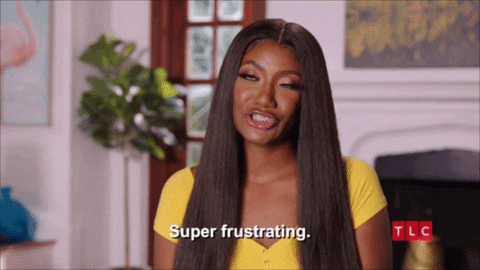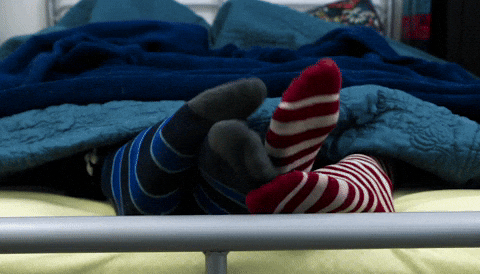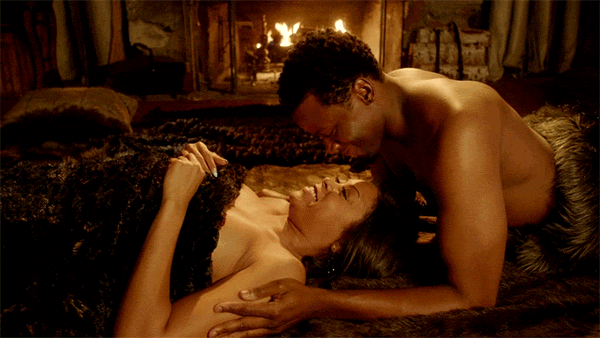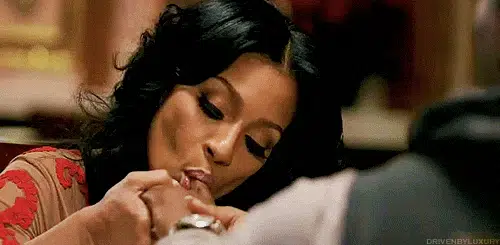I know. This one might sound a little weird off top but trust me when I say that it comes from very up close and personal experience. Where to begin. Hmm. While I didn't really discover my true bra size until my 40s (damn shame; it's a 36H, by the way), when it came to sexual activity, my breasts were a spot that was almost always my sex partners' immediate go-to. Looking back, I think their logic was, since my breasts are so big, surely caressing them, kissing them and whatever-else-ing them would automatically get me off, right? WRONG. Although a few guys were the exception, for the most part, focusing a lot on my breasts during foreplay was semi-irritating, if not straight up annoying AF (more on that in a sec).
That fact is what inspired me to write this all out. We've all got erogenous zones, so true, so true. Yet if you happen to be someone who semi-suffers in silence because the areas that you need tending to oftentimes go overlooked while "the obvious ones" get more attention than what you'd actually prefer, you are not alone, sis. From personal experience and empathy, here's what you can do about it.
What Is an Erogenous Zone Exactly?
Let's start off with what an erogenous zone is and what some of the more common ones are. The really basic explanation of an erogenous zone is it's a place on you or your partner's body that is or can be easily sexually aroused; it's the go-to spots during foreplay.
Here's the thing, though. Oftentimes, when the topic of erogenous zones comes up, it's the popular places that get a ton of the focus. Those would be places like the ears, neck, breasts (or even just the nipples), naval, genital region, and, of course, the mouth. Since these are the "zones" that get so much clout (in the media, especially), it's common for partners to automatically go to these spots because they assume that their partner wants them to.
Here's the thing about that. There are tons of other places that get people "ready to go" that have nothing to do with the areas that I just mentioned. Other spots that are turn-ons for some people include their scalp; inner wrists; hands (and/or fingers); armpits (no, for real); thighs; lower back; buttocks; in between their shoulder blades, and even their feet. While fondling someone's armpits or making sure to kiss them behind their knees would be the last thing you would consider, you could be missing out on turning your partner on, on a whole 'nother level, if you don't at least be open to the fact that they might really like it.
So, stop and think about it. Do you actually know what your partner's erogenous zones are? Come to think of it, are you even 100 percent sure what yours are? Because, the reality is, if your partner hasn't totally explored your body, there could be some uncharted territory that neither of you have ever considered; areas that could turn light bulbs on in a whole new way, chile. Here's why.
Always Remember That Erogenous Zones Are DEFINITELY Individually Based
According to science, when it comes to us (meaning women) specifically, word on the street is that our neck, forearms, vulva (including your clitoris and clitoral hood), and vagina are the most sensitive parts of our body while our areola (the darker part of breasts that surrounds our nipples) are the least. Science also says that when pressure is applied to our body, our clitoris and nipples are the most sensitive while the sides of our breasts and our abdomen are the least. Again, that's what science says.
For me, though, my forearms aren't sensitive at all. Meanwhile, my fingers are—big time. And while my nipples are sensitive, it's only during the act of penetration itself that I actually don't mind them being played with; prior to that, like during foreplay, playing with them is typically more irritating than anything else. Sharing this actually reminds me of a past sex partner who was the opposite of me. He really enjoyed his nipples being played with during foreplay but during sex, he said it was the equivalent of fingernails on the chalkboard.
What all of this points to is the fact that we're each an individual. Just because, at the end of the day, we basically have the same parts, that doesn't mean that we're stimulated or aroused in the same way. This is why I'm such a huge fan of foreplay—and afterplay. By taking out the time to relish in your partner, you get to learn what parts of their body truly turns them on—and what parts don't.
It can help you to get away from assuming that it "should" be their breasts or their neck or even the genitalia all of the time (some people reserve that area for intercourse while preferring other spots to be explored before penetration transpires).
And why are we all so different? I mean, we were made uniquely. Plus, we've all had different experiences too. Something else that is worth keeping mind is different spots might be turn offs due to past sexual abuse or trauma; someone who is still working through healing from a past relationship; there even being a bit of a phobia if they had a less-than-satisfying sexual experience with a former partner; a person having body image issues, or even someone having sex for the first time. This is why verbal communication can be super beneficial prior to having sex in the first place; it can teach you to not have a one-size-fits all (so to speak) approach with your partner (and vice versa).What If Your Erogenous Zones Aren’t Where Your Partner Gravitates to Most?
So, what if all of this makes perfect sense to you and you do indeed have a partner who goes to the "common spots" while leaving uncharted territory alone far too often? One of the things that I advise married couples that I work with is to not have deep sexual conversations…during sex. Outside of dirty talk and offering up some clarification (not barking orders but letting your partner know what turns you on the most), it's best to share what your heartfelt sexual needs are when you're enjoying dinner alone or even just hanging out on the couch together. Waiting until times like these can help your partner to feel less critiqued or self-conscious.
Another tip is to play show and tell. During the act of foreplay, take your partner's hands and direct them to the places where you like to receive the most attention. And when he hits that spot—with whatever you both like for you to be "hit" with—make sure he knows with a word, a moan or even an affirmation (I don't know one man who doesn't know to be verbally affirmed in bed, chile). Far too often, a person can be pleased in bed, but they don't get as much pleasure as they would like because their partner has no clue what they really like or would like to receive more. Even if you're not super verbal, there are other ways to send cues…if you know what I mean.
And what if your least favorite zones are the ones that your partner seems to like most? Yeah, that's another dilemma that isn't discussed as much as it should be. Some of the men I've been with are breasts men, so they wanna be all over them for their own sake. I get that. Since it's not so much my breasts as it is my nipples that I'm annoyed by during foreplay, I try and keep them occupied in other ways during foreplay, since I am much less guarded with my nipples during intercourse. I've also learned that I do like to be kissed in between my breasts at any time, so I'm pretty sure you can just guess how much men like to put their face between two huge breasts, at pretty much any time. It really is all about patience and communication. Besides, the more at ease I feel with my partner, the more I'm willing to make some compromises because I want him to be turned on as much as I want him to turn me on too.
Some of this really is all about trial and error. The bottom line is you shouldn't feel self-conscious, high-maintenance, or "weird" because you might not get sexually stimulated in the same places that your favorite website says or even one of your girlfriends does. You also shouldn't hesitate to speak up and let it be known with your partner about what works for you—no matter how atypical or uncommon those areas may be (remember to grant him the same courtesy).
At the end of the day, erogenous zones are supposed to make you want to have sex. Enjoy exploring where those places are for you and be OK with the fact that they may be super exclusive. After all, you are, so that would make absolutely perfect sense, sis.
Join our xoTribe, an exclusive community dedicated to YOU and your stories and all things xoNecole. Be a part of a growing community of women from all over the world who come together to uplift, inspire, and inform each other on all things related to the glow up.
Featured image by Giphy















